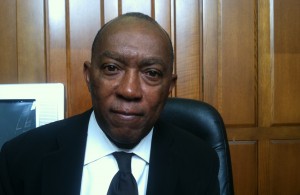Two Bills, Two Different Futures For the System Benefit Fund

Photo by Bob Daemmrich/Texas Tribune
State Senator John Carona has filed legislation that would prevent money from being diverted from the System Benefit Fund. That fund's original purpose was to help low income and senior citizens to pay their electric bills.
If the $850 million in the System Benefit Fund still sits idle come 2014, it won’t be for a lack of trying to fix it.
State Senator John Carona (R-Dallas) filed two bills recently related to the massive, unused benefit fund. One of those bills would realign the fund with its originally intended purpose, to help low income and senior citizens pay their utility bills.
It has been years since the fund has helped pay utility bills and educate ratepayers, as StateImpact Texas reported in November. Today, it sits and collects money through a small fee collected from electric customers in deregulated areas. Its main function has become serving as a crutch to help lawmakers balance the budget.
Steven Polunsky, a spokesman for Sen. Carona and Director of the Committee on Business and Commerce, which Carona chairs, said Carona tried in vain to pass a similar bill in the last legislative session.
“[Carona’s] top priority is fixing the System Benefit Fund so that it collects the appropriate amount of money and distributes that amount of money for the uses that are intended in statute,” Polunsky said.

Mose Buchele for StateImpact Texas
State Rep. Sylvester Turner helped create the System Benefit Fund. He is now one of its most vocal critics.
Carona began as a legislator more than 20 years ago in the Texas House. He became a Senator in 1996, three years before Representative Sylvester Turner (D-Houston) helped write a bill in 1999 that would create the System Benefit Fund. He anticipated deregulation of Texas electricity could cause price spikes that would adversely affect those least able to pay their utility bills.
As Chairman of the Committee on Business and Commerce, Carona is obliged to try to right the benefit fund. And while attempts to fix the fund in the past have proven fruitless, Carona’s spokesman sees reasons for hope.
Polunsky says there’s a new group in the legislature that is less beholden to the old ways, and that ran on transparency and openness. Seasoned leaders have also talked about reducing diversions.
Governor Rick Perry addressed the System Benefit Fund issue indirectly in his State of the State address in January.
“We also need to do away with the practice of using dedicated funds and specific fees for anything other than the purpose for which they were intended,” Perry said. “If we don’t need taxpayer money for that purpose, let’s not collect it at all.”
The fund, overseen by the Public Utility Commission (PUC), began veering from its original mission about three years after it came into existence when the education program, intended to help ratepayers understand their new options in a deregulated market, ceased.
In 2003, thousands of names were removed from the benefit recipient list. Two years later, in 2005, most low-income families stopped receiving benefits (but some of those families have since received partial benefits from the fund).
Although the PUC oversees the fund, the money in it is tied into the legislative process.
If Carona’s bill to realign the benefit fund with its original purpose doesn’t work, he has a Plan B. He has introduced a second bill that will spend down the fund and end the ratepayer fee in January, 2014. And that would be the end of the System Benefit Fund.
“If the wall won’t move, you get tired of hitting your head against the wall,” Polunsky said.
